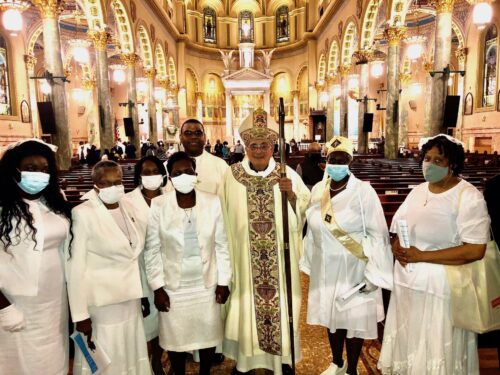
PROSPECT HEIGHTS — Meredith Chandler’s roots at St. Peter Claver Church run deep. Not only was she baptized there, but her grandmother, Mary Chandler, was an original parishioner when the church was founded in 1921.
So Meredith wasn’t going to miss a minute of the celebration of the church’s 100th anniversary.
“I live right across the street from the church. My family has been there since the beginning. All of us were baptized there. We had our sacraments there and went to school there. So we feel a close connection to the church,” she said.
The Diocese of Brooklyn marked the 100th anniversary of the founding of St. Peter Claver Church on Sept. 9 — the saint’s feast day — with a special Mass celebrated by Bishop Nicholas DiMarzio.
Because it was a diocesan-wide celebration, the Mass, commemorating both the feast day and the anniversary, took place at the Co-Cathedral of St. Joseph in Prospect Heights.
Located in Bedford-Stuyvesant, St. Peter Claver Church was the first Catholic church in Brooklyn to be established for the African-American community. It was founded by Msgr. Bernard Quinn, a man many black Catholics consider an icon for his efforts fighting racism in the 1920s. The Diocese of Brooklyn is advocating for the Catholic Church to declare him a saint.
Because of its history as the first African-American parish, St. Peter Claver Church is an important part of the Bedford-Stuyvesant community, said Estella White-McDuffey, a lifelong parishioner who is a lector at Sunday Masses. “Even people who did not grow up Catholic, or didn’t grow up in the parish, have a connection of sorts to St. Peter Claver,” she said.
The centennial celebration serves as a unifying force locally, said Michael Davis, the head usher at Our Lady of Victory Church, also in Bedford-Stuyvesant.
“It helps to enhance the actual bonds of the community as well. With everything that’s going on — between COVID, economic disenfranchisement and the Black Lives Matter movement — this is something that we can agree on,” he said.
St. Peter Claver, Our Lady of Victory, and Holy Rosary are all part of the same Brooklyn parish, St. Martin de Porres.
The man for whom St. Peter Claver Church is named was a Spanish Jesuit who left his homeland in 1610 to travel to the New World. He settled in Cartagena, Colombia, where he was ordained in 1615. Cartagena was a center of the slave trade at the time, and 10,000 slaves a year were brought there. Peter Claver ministered to the slaves, baptizing an estimated 300,000 people in his lifetime.
He died in 1654 and was canonized by Pope Leo XIII in 1888.
Bishop DiMarzio referred to St. Peter Claver as “our icon of racial justice” and said Catholics could use him as an example in their own lives.
“We celebrate his contribution to the Church, and we recognize that we have to make our own contribution to improve things today. He did something in his time, and we have to do something in our own,” he said.
In his homily, Bishop DiMarzio, who established a Commission on Racism and Social Justice in the Diocese, talked about the importance of education in combating racism.
“We need to teach our young people about racism and about the universal brotherhood, and sisterhood, that all of us share as Christians. More than once, I have said that racism is the original sin of America,” he said.
Father Alonzo Cox, pastor of St. Martin De Porres Parish and coordinator of the African-American Apostolate for the Diocese, said St. Peter Claver has much to teach people today.
“I think one of the things that we can do to live like St. Peter Claver is to really look at each other as brothers and sisters. No matter what ethnic background we may have, no matter what social aspect you may belong to, St. Peter Claver looked at everybody as a brother and sister. And so we pray today for his intercession, that we will be able to look at each other as members of the Mystical Body of Christ, as members united in the love of Jesus Christ,” he said.
Bishop DiMarzio also paid tribute to Msgr. Quinn and his role in starting St. Peter Claver Church.
“He is our own local hero and hopefully someday a saint. At a very difficult time, he stood up against people in the Church and outside the Church for the benefit of black Catholics and other blacks. And we want to pick up the baton and move it along and keep doing things better,” Bishop DiMarzio said.
